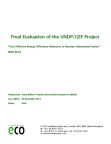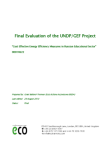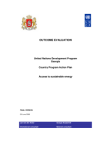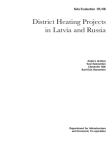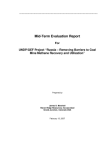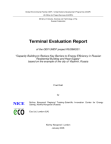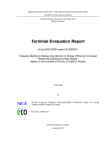The overall objective of the project is to contribute to the abatement of greenhouse gas (GHG) emissions by improving the energy efficiency of Russian educational facilities.Develop replicable models for low-cost energy efficiency measures in both municipal secondary schools and Federal education
Russia
Cost Effective Energy Efficiency Measures in the Russian Educational Sector
The project, aimed to reduce energy consumption by about 20 to 25 percent in project supported schools leading to a reduction in CO2 emissions by an estimated 9, 000 tons over the project period (3 years), and by 60, 000 tons over the 20-year average life time of the investments.
Russian Federation - Municipal Heating Project
The overall objective of the Russian Federation Municipal Heating Project is to alleviate the financial burden on municipal governments associated with the supply of district heating to the local population. The project aimed to achieve this by improving the operating efficiency of district hea
Access to sustainable energy improved through increased electricity production by using indigenous renewable energy resources, improved energy efficienct and the development of Georgia's Energy Corridor
In Georgia, the United Nations Development Program (UNDP) aims to provide a support role for the country, especially in the area of poverty alleviation, private sector development, fostering democratic governance and strengthening local government, conflict alleviation and
District Heating Projects in Latvia and Russia
Sida supported several District Heating (DH) rehabilitation in Latvia and Russia from the mid-90s. This Evaluation assesses five DH rehabilitation projects in 1994-2003 of which four were selected to fit the objectives of the First Baltic Billion Fund (FBBF).
Removing Barriers to Coal Mine Methane Recovery and Utilization - Russia
The project is designed to overcome the barriers that impede the implementation and financing of coal mine methane (CMM) recovery and use projects in Russia; and by doing so, contribute to the reduction of greenhouse gas (GHG) emissions to the atmosphere.
Capacity Building to Reduce Key Barriers to Energy Efficiency in Russian Residential Building and Heat Supply
The development objective was to provide sustainable and replicable models and to build the required capacities for overcoming barriers to implementation and realization of energy-efficiency improvements and energy conservation in residential buildings an
Capacity Building to Reduce Key Barriers to Energy Efficiency in Residential Buildings and Heat Supply
The project has aimed to enhance capacities in both the private and public sectors in the city to overcome barriers to energy-efficiency investments in residential buildings and the related heat-distribution systems, and disseminate experiences to other cities in the Russian Federation.
Ozone-Depleting Substance Consumption Phase-Out GEF Project
The overall original objective of the Russian Federation Ozone Depleting Substance Consumption Phase Out Project (the Project) was to assist Russia in the phase-out of ODS consumption, in a manner consistent with international efforts in the field, while ensuring that this is accomplished with th
Energy Efficiency Project
This report evaluates the Gas Distribution Rehabilitation and Energy Efficiency Project, financed by a loan worth US$106.5 million from the World Bank, which aimed to increase the efficiency of energy use in slected regions of Russia, to improve the efficiency and safety of gas distribution, and



